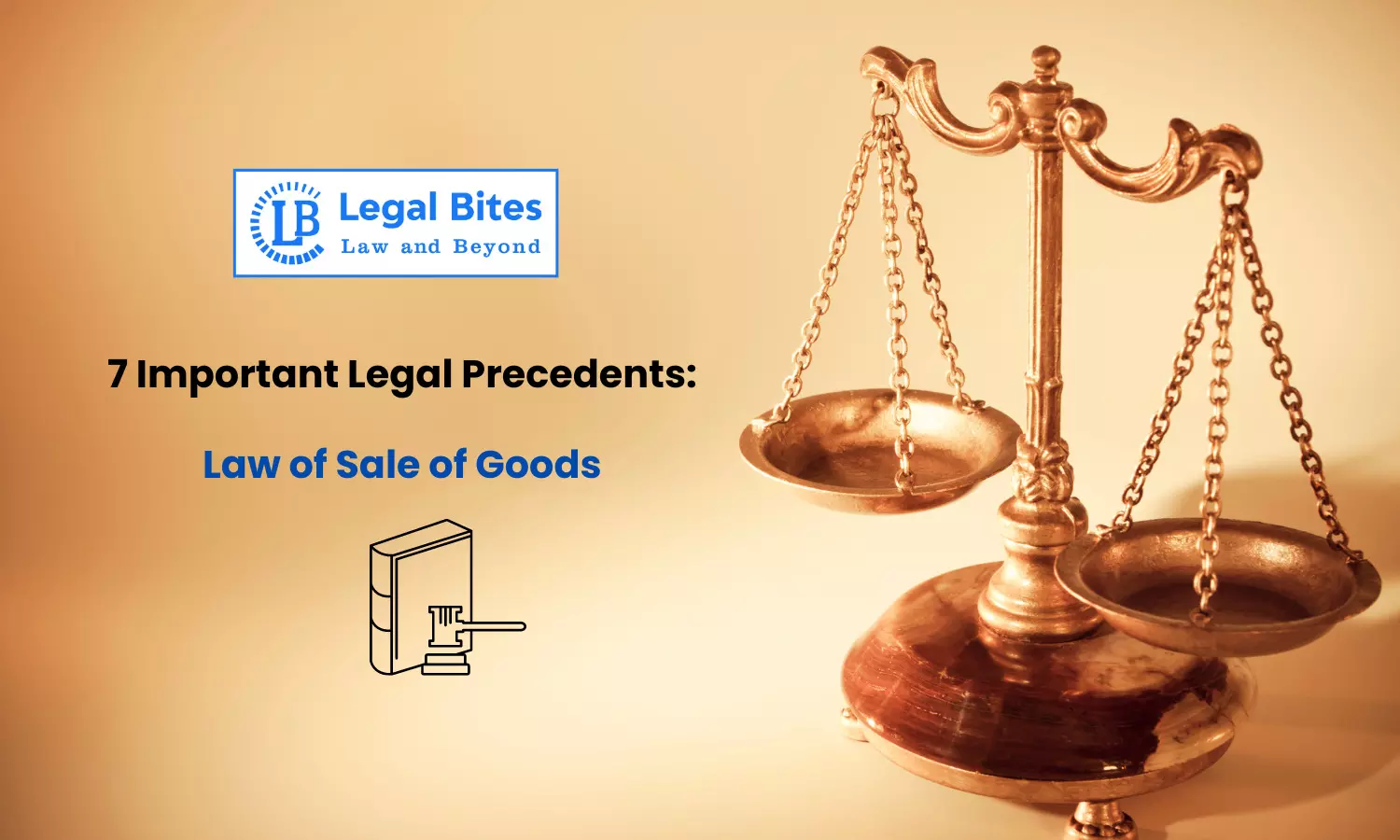7 Important Legal Precedents: Law of Sale of Goods
This article provides a thorough examination of seven significant cases associated with the Sale of Goods Act, 1930, offering a comprehensive overview.

In India, the Sale of Goods Act, 1930 came into effect on 1st July 1930. It tends to meticulously define terms like buyer, delivery, goods and specific goods. The Act covers various aspects such as the formation of contracts, conditions and warranties, transfer of ownership, and remedies for breach of contract. It is also closely associated with the Indian Contract Act 1872, as several aspects of the selling of goods require governance from both Acts. Its provisions aim to ensure fairness, transparency, and efficiency in commercial transactions involving the sale of goods.
Click Here to Take a Closer Look at the Sale of Goods Act, 1930
1. State of Madras v. Gannon Dunkerley & Co.,(Madras) Ltd [1]
The Gannon Dunkerley & Co (Madras) Ltd, engaged in construction projects of buildings, roads and other works which were charged sales tax by the authorities who wanted to include the cost of materials used in their taxable turnover. The company disputed this, arguing that the state legislature couldn't impose a tax on materials used in construction, as they weren't directly sold. The High Court agreed, stating that construction contracts were for services, not the sale of materials, and thus, the tax law was invalid. The Supreme Court upheld this, saying for something to be considered a sale, “there must be an agreement between the parties for the sale of the very goods in which eventually property passes.” Buildings contracts are considered as entire as well as indivisible and so there occurs no sale of goods. The Supreme Court held that a works contract is not a sale.
Click Here to Read (Bottom of P.g.1) the Official Judgement
2. P.S.N.S. Ambalavana Chettiar v. Express Newspapers Ltd. [2]
This case involves Section 18 of the Sale of Goods Act, 1930 which implies that the property doesn't pass until goods are identified. Initially, the respondent agreed to sell 415 tons of stock to the appellant, with the property passing upon agreement. Later, they modified the contract orally to specify the sale of 300 tons. The appellant accepted only some stock but refused the rest, thus repudiating the contract. Therefore, the respondent sold the remaining goods to a third party and sought damages.
The court held,
"As no time was fixed under the contract of sale for acceptance of the goods, under s. 73 of the Indian Contract Act, the respondent was entitled to the difference between the contract price and the market price on 29th March 1952, the date of repudiation, as damages.”
Click Here to Read the Official Judgment
3. Vishnu Agencies (Pvt.) Ltd. Etc v. Commercial Tax Officer & Ors. Etc [3]
The Cement Control Order in West Bengal and the A.P. Procurement Order impose restrictions on the sale and purchase of cement and rice, respectively, setting fixed prices and requiring licenses or permissions for transactions. Despite arguments that these transactions should not be considered sales under the Bengal Finance Sales Tax Act due to the lack of voluntary agreement and fixed prices set by authorities, the court ruled that they still qualify as sales subject to taxation, including cement sales between allottees and permit-holders, and rice transactions between growers, millers, and wholesalers or retailers.
Click Here to Read the Official Judgment
4. Mysore Sugar Co. Ltd. vs Manohar Metal Industries [4]
The plaintiff (Mysore Sugar Company) offered various items like copper ingots, copper scraps, and brass tubes for sale at Mandya. The defendant was willing to purchase those items, and the plaintiff accepted the offer. However, the buyer did not collect the goods. So, a notice was given to the buyer that the contract would be cancelled if the goods weren't collected within three days. As the buyer failed to take any action, about this the seller resold the goods after three months and sought damages. This case is a good example to understand sale is not generally rescinded by lien or stoppage in transit i.e. Section 54 of the Sale of Goods Act, 1930.
Click Here to Read (Middle of P.g.26) the Official Judgment
5. RD Saxena v. Balram Prasad [5]
In this case, RD Saxena was an advocate who was appointed as a legal advisor for Madhya Pradesh State Cooperative Bank Ltd. Later, RD Saxena’s appointment was terminated. However, he later refused to hand over files belonging to the bank, in return for his full payment. RD Saxena was exercising his right to lien on those files.
The court held that the files do not fall under the ambit of goods, therefore, the right to lien cannot be exercised in this scenario as the files in question were already the property of the bank and were given to advocate Saxena only for analyzing and studying them. The Hon'ble Supreme Court said:
On the basis of the complaint as well as the documents available on record we are of the opinion that the Respondent is guilty of professional misconduct and thereby he is liable for punishment.
Click Here to Read the Official Judgment
6. State of Orissa v. Titaghur Paper Mills Co. Ltd. [6]
The Supreme Court held that the notifications issued on May 23, 1977, and December 29, 1977, along with their respective entries levying a purchase tax of ten percent on bamboo agreed to be severed and standing trees agreed to be severed, were not beyond the legislative competence of the State Legislature or ultra vires to the Orissa Sales Tax Act 1947.
The court said that the subject matter of the provisions fell within the definition of "goods" as per the Sales of Goods Act and the Orissa Act, comprising a completed purchase of goods. Subsequently, the notifications and their specified levies were considered constitutional as well as valid. It was also stated that the bamboo contract is related to the immovable property along with several ancillary rights.
7. Badri Prasad v. State of Madhya Pradesh and Anr. [7]
There was an agreement between the parties about the specific forest of Madhya Pradesh. Teak trees with girths more than 12 inches could only be chopped by the appellants. Then appellant could not cut trees to exercise his rights under the contract after an Act was passed. Thus, it was held that the forest and trees are the State’s property, and the appellant has no right to chop down the teak trees with girths greater than 12 inches. But under that description, it needed to be mentioned about the fallen trees. They won’t be considered ascertained commodities under the Sale of Goods Act until it is determined.
Click Here to Read the Official Judgment
Contributions from: Apurva Neel & Husain Rizvi
References
[1] 1958 AIR 560
[2] 1968 AIR 741
[3] 1978 AIR 449
[4] AIR1982 Kant 283
[5] AIR 2000 SC 2912
[6] 1985 AIR 1293
[7] 1966 AIR 58
Important Links
Law Library: Notes and Study Material for LLB, LLM, Judiciary, and Entrance Exams

